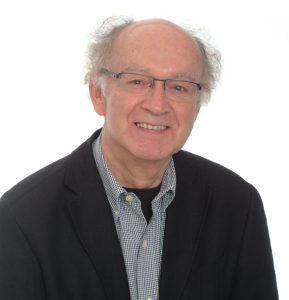 Founding member of the CRC in 1984, director of the Oncology axis of the CRCHU de Québec-Université Laval and member of the CRC's Management Committee (2012-2015), Dr. Jacques Huot is one of the pioneering researchers who established the experimental bases allowed the emergence of a field of biomedical research in cell signaling of the stress response, in Quebec and Canada. He played a key role in the creation of the “Signalisation-Québec” network with Drs. Nathalie Rivard and Josée Lavoie.
Founding member of the CRC in 1984, director of the Oncology axis of the CRCHU de Québec-Université Laval and member of the CRC's Management Committee (2012-2015), Dr. Jacques Huot is one of the pioneering researchers who established the experimental bases allowed the emergence of a field of biomedical research in cell signaling of the stress response, in Quebec and Canada. He played a key role in the creation of the “Signalisation-Québec” network with Drs. Nathalie Rivard and Josée Lavoie.
His collaboration with Dr. Jacques Landry, member emeritus of the CRC, led to the identification of the molecular chaperone HSP27 and its phosphorylation as important factors in cellular resistance to oxidative stress and certain anti-cancer drugs. These results are among the first to suggest a role for heat shock proteins in cancer cell resistance. Since then, the targeting of stress proteins in cancer has been used as a potentially selective therapeutic approach.
His work demonstrated for the first time that the p38 pathway was responsible for the phosphorylation of HSP27 in response to the growth factor VEGF and that it regulated the migration of endothelial cells. Previously perceived as a signaling pathway for stress, the p38 pathway was thus established as an important pathway for regulating cell motility. Dr. Huot has deciphered the p38 pathway activated by VEGF and provided evidence of its role in the regulation of angiogenesis and metastatic progression. With Dr. Martin Simard, he reported the first evidence of the role of microRNAs in the regulation of p38 activity. Another achievement of Dr. Huot was to demonstrate the role of the ERK/DAPK/tropomyosin1a axis in the regulation of actin dynamics. Finally, his collaboration with Drs Isabelle Corre and François Paris from Nantes has helped to clarify the role of p38 and nucleophosmine in the response of endothelial cells to oxidative stress.
The Department of Molecular Biology, Medical Biochemistry and Pathology of Laval University's Faculty of Medicine recognized the importance of his achievements by awarding him its Excellence Award in 2015. In 2012, he received the Jacques Leblanc Prize for the quality of its supervision of 2nd and 3rd cycle students.
Dr. Huot has always been heavily involved in teaching at the three university cycles. He has largely contributed to the creation of undergraduate courses in pharmacology in dentistry and nursing. He was a pillar professor in the 2nd and 3rd cycle Molecular and Cellular Biology programs. With Dr. Normand Marceau and Dr. Josée Lavoie, he set up one of the most popular optional courses for students in the "research" programs of the Faculty of Medicine, namely the course: Cellular and Molecular Foundations of Cancer . He has taught courses on more than 50 different subjects, pharmacology and cell biology.